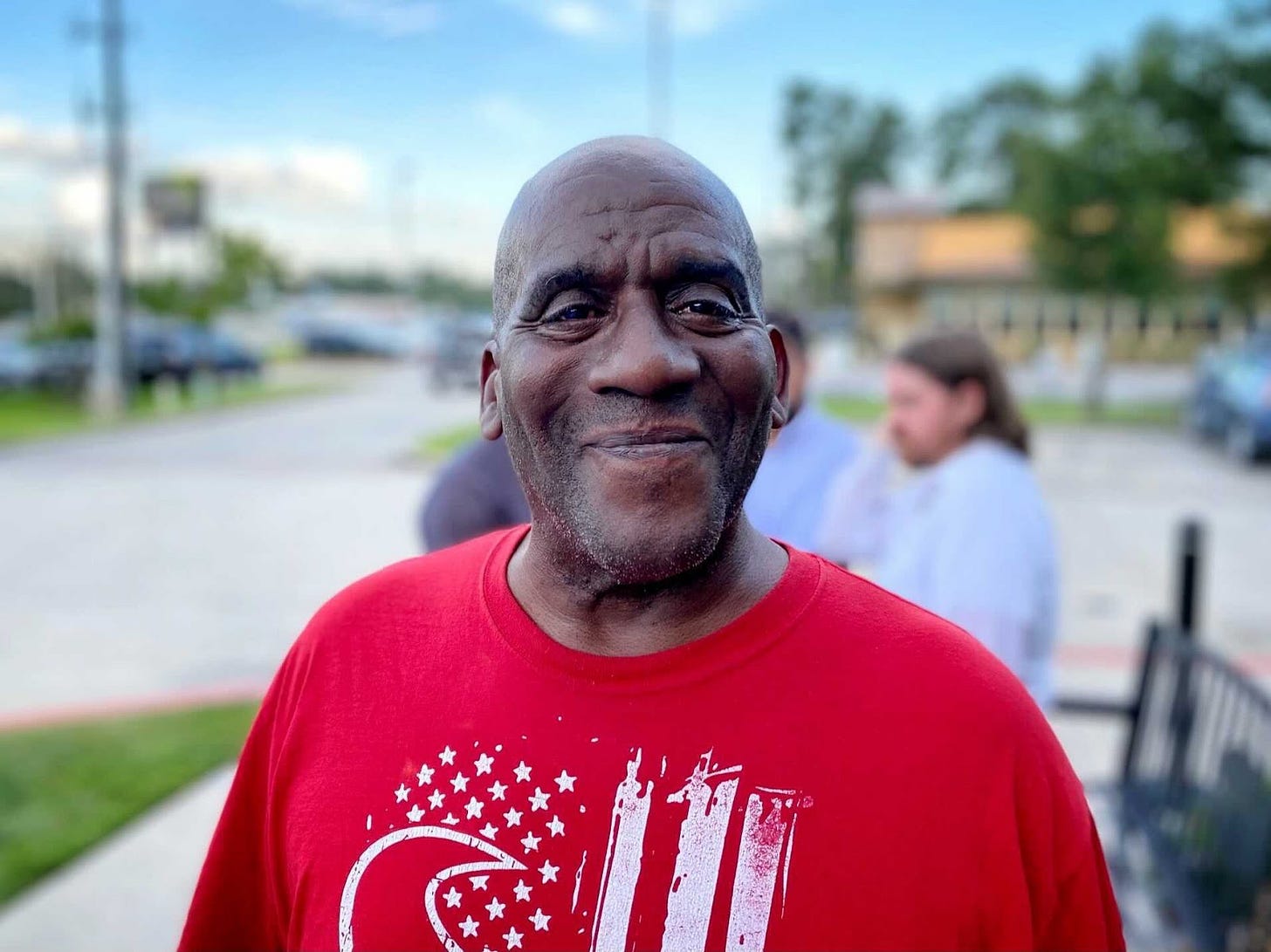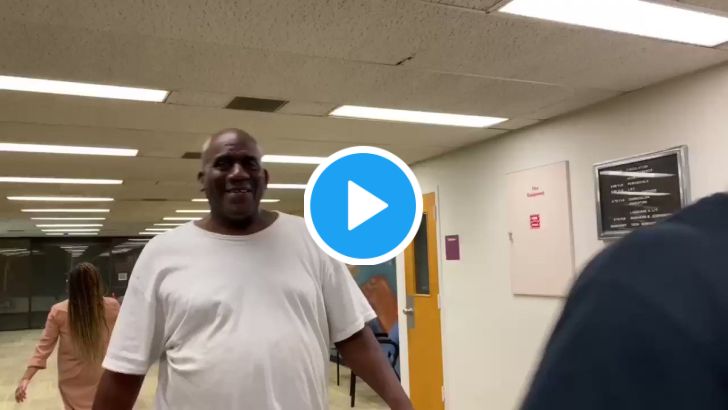The persecution of Hervis Rogers
It was 7 PM on March 3, 2020, and the line to vote in the Texas primary stretched on for hours. Hervis Rogers had to report to one of his two jobs at 6 AM the next morning. But Rogers was determined to cast his ballot in Harris County. When he was finally able to vote more than 6 hours later, he still had a positive attitude.
"My point is this: Don't complain. If you get out and vote, then you can say, ‘well at least I tried to do my part,’" Rogers said as he exited the polling station around 1 AM.
Now, Rogers faces decades behind bars.
In 1995, when Rogers was about 36 years old, he was convicted of burglary and was incarcerated for nine years. He was released on parole in 2004. But in Texas, parolees are ineligible to vote. Rogers' parole ended in June 2020, at which time his voting rights would have been restored.
Rogers was arrested this Saturday and charged with two felony counts of illegal voting by Texas Attorney General Ken Paxton (R). The charges were based on Rogers' vote in the March 2020 primary and one other vote in November 2018. The felony counts carry a possible sentence of 40 years in prison. And since Rogers has a prior conviction, he could receive an even higher sentence. Paxton, who filed suit in the Supreme Court to overturn the 2020 election results, has been determined to prove that voter fraud tainted the election results in Texas and elsewhere.
Rogers, a 62-year-old man, is accused of a non-violent offense with no victims. Nevertheless, he was held on $100,000 bail. He was released on Sunday night after a successful crowdfunding effort.
The persecution of Rogers illustrates how the criminal justice system is abused in Texas to discourage turnout, promote political narratives, undermine fundamental rights, and target minority groups.
Bail abuse
While charging Rogers with felonies is an abuse of prosecutorial discretion, holding Rogers on $100,000 cash bail for voting while on parole is completely indefensible. What is the risk to society if Rogers is released pending the resolution of the charges?
It is a stark example of how Texas prosecutors and judges can abuse the bail system. There are 60,000 people behind bars in Texas jails. Three out of four have not been convicted of a crime. Instead, they are incarcerated because they cannot afford bail. The abuse disproportionately impacts Black Texans who "are incarcerated at more than twice the rate of their white counterparts."
The special Texas legislative session that began July 8 will consider legislation that would make it even "harder for people arrested to bond out of jail without cash." The bill would "ban the release of those accused of violent crimes unless they had enough cash, as well as restrict charitable groups’ ability to pay to get people out of jail." Were that bill current law, Rogers may not have been able to have been released since his bail was paid for with a crowdfunding effort.
Intentional confusion
In March 2020, Rogers was not trying to commit a crime. He voted because he believed he was eligible to vote. If he was attempting to get away with violating the law, Rogers would not have spoken to numerous media outlets after casting his ballot.
Why didn't Rogers know whether or not he was eligible to vote while on parole? In 2007, the Texas House and Senate passed legislation that would have "required the Texas Department of Criminal Justice to provide written notification to discharged prisoners regarding their voting eligibility." That bill was vetoed by then-Texas Governor Rick Perry.
Criminal defense lawyers in Texas argue that current Texas law requires someone to knowingly vote illegally in order to violate the statue. But that didn't prevent the conviction of Crystal Mason who voted while on federal parole in 2016. Mason arrived at the polling location and was not on the list of registered voters. An election worker gave her a provisional ballot. Mason's ballot was never counted but, after a one day trial, she was sentenced to five years behind bars.
Mason served time in federal prison but her conviction is currently under appeal. Prosecutors argue that Mason only needed to be aware of the fact that she was on parole — not that being on parole made her ineligible to vote. The Texas Court of Criminal Appeals has agreed to consider her case.
Democrats, including Texas Representative John Bucy (D), are trying to revive the provision that would advise parolees about their eligibility to vote. Republicans continue to oppose the measure.
Paxton goes forum shopping
Hervis Rogers lives in Harris County and cast his ballot in Harris County. But Paxton charged Rogers in neighboring Montgomery County. What gives?
In Texas, "violations of election law may be prosecuted in the county where the alleged crime was committed, or an adjoining county." Harris County is racially diverse and one of Texas' most progressive counties. Montgomery County, however, is one of the state's most conservative and just 4% of its residents are Black.
Paxton "has a history of bringing charges in adjacent counties that are more conservative and more likely to have juries, grand juries and judges sympathetic to his cases."
Why now?
Officials in Texas have known about the issues regarding Rogers' vote since early 2020. The facts are not complicated and do not require further investigation. So why is Rogers being charged now?
Rogers' arrest comes as Texas convenes a special session to consider new restrictions on voting. These restrictions are motivated by Trump's false claims of voter fraud. Paxton is using the arrest to obscure the fact that he has spent tens of thousands of hours investigating potential voting fraud and come up with almost nothing.
Paxton's office "spent more than 22,000 staff hours tracking voter fraud cases in 2020, yet resolved just 16 prosecutions." All 16 prosecutions "involved Harris County residents who gave false addresses on their voter registration forms." None resulted in jail time.
Appearing on Fox News Sunday, Governor Greg Abbott (R) — who called the special session to address Texas' supposed problem with voter fraud — cited the indictment and arrest of Rogers as proof that voter fraud was a problem in Texas.
Paxton's glass house
Paxton is attempting to convict Rogers of multiple felonies for voting when Rogers did not know that he was ineligible to vote. Paxton himself, however, was indicted on securities fraud charges nearly six years ago.
While a member of the Texas House, Paxton allegedly "persuaded investors to buy stock in a technology firm without disclosing he would be compensated for it." He faces up to 99 years behind bars if convicted. Since his indictment, Paxton has used numerous tactics to delay the trial including an extended dispute on where the case against him should be tried.
According to the Associated Press, Paxton is also under FBI investigation for "using his office to benefit a wealthy donor." Former senior aides to Paxton allege "Austin real estate developer Nate Paul helped Paxton remodel his house and gave a job to a woman with whom Paxton allegedly had an affair." In return, "Paxton used his office to help Paul’s business interests, investigate Paul’s adversaries and help settle a lawsuit." Paxton fired the aides last year.
When I’m looking for credible, up-to-date information about voting rights, I turn to attorney Marc Elias. Through his organization, Democracy Docket, Elias produces a weekly newsletter that is a one-stop-shop for info around the state of voting in this country. It’s an invaluable resource. Subscribe here!






What a terrific column, Judd, exposing the hypocrisy of Rogers' arrest as 'proof' of voter fraud, and ending be exposing the real criminals in this mix.
Not that I don't value the focus on all the corporate donations in violation of outwardly stated principles, but I really appreciate this post as a spotlight on an abusive criminal justice system. Did Hervis Rogers commit a crime by voting as a parolee? By the letter of the law, yes, but it's an absurd law with an even more absurd potential sentence looming if he's found guilty. Thanks, Judd.